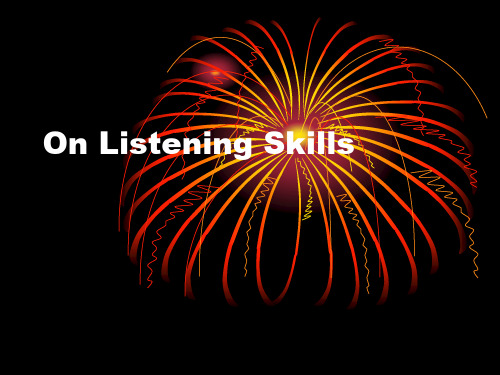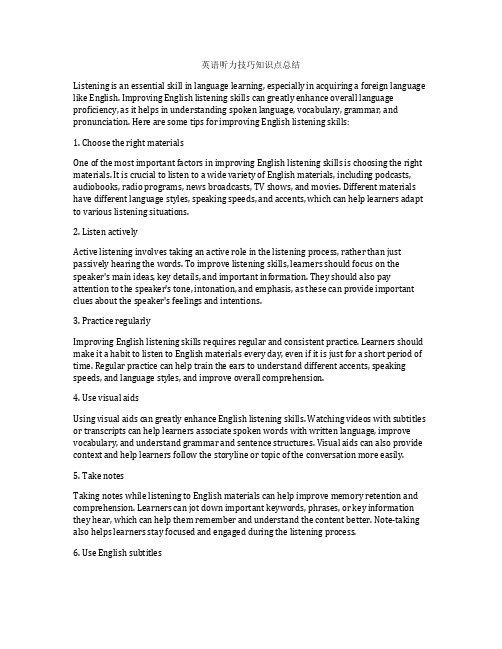培训学习资料OnListeningSkills解读
On Listening Skills解读

III. Can’t remember so much? – Learn to select, learn to simplify
One common unpleasant / frustrating experience with listening: • while listening, you seem to understand everything that you hear, but as soon as the voice stops, all is gone!
V. Don’t attempt to write too much
• Note-taking is essential in
listening. It helps us organize facts and retain concepts for later use.
V. Don’t attempt to write too much
III. Can’t remember so much? –
Learn to select, learn to simplify
Two perspectives: • differences between comprehension & production
英语听力技巧知识点总结

英语听力技巧知识点总结Listening is an essential skill in language learning, especially in acquiring a foreign language like English. Improving English listening skills can greatly enhance overall language proficiency, as it helps in understanding spoken language, vocabulary, grammar, and pronunciation. Here are some tips for improving English listening skills:1. Choose the right materialsOne of the most important factors in improving English listening skills is choosing the right materials. It is crucial to listen to a wide variety of English materials, including podcasts, audiobooks, radio programs, news broadcasts, TV shows, and movies. Different materials have different language styles, speaking speeds, and accents, which can help learners adapt to various listening situations.2. Listen activelyActive listening involves taking an active role in the listening process, rather than just passively hearing the words. To improve listening skills, learners should focus on the speaker's main ideas, key details, and important information. They should also pay attention to the speaker's tone, intonation, and emphasis, as these can provide important clues about the speaker's feelings and intentions.3. Practice regularlyImproving English listening skills requires regular and consistent practice. Learners should make it a habit to listen to English materials every day, even if it is just for a short period of time. Regular practice can help train the ears to understand different accents, speaking speeds, and language styles, and improve overall comprehension.4. Use visual aidsUsing visual aids can greatly enhance English listening skills. Watching videos with subtitles or transcripts can help learners associate spoken words with written language, improve vocabulary, and understand grammar and sentence structures. Visual aids can also provide context and help learners follow the storyline or topic of the conversation more easily.5. Take notesTaking notes while listening to English materials can help improve memory retention and comprehension. Learners can jot down important keywords, phrases, or key information they hear, which can help them remember and understand the content better. Note-taking also helps learners stay focused and engaged during the listening process.6. Use English subtitlesUsing English subtitles can be a helpful way to improve listening skills, especially for learners who are not yet confident in their listening abilities. English subtitles can provide a written representation of the spoken words, which can help learners follow along and improve understanding. However, it is important for learners to gradually reduce their reliance on subtitles as they improve their listening skills.7. Listen to different accentsEnglish is spoken in many different accents around the world. Listening to a variety of accents can help learners become familiar with different speech patterns, intonation, and pronunciation. This can be particularly useful for learners who plan to communicate with speakers of different English accents, such as British, American, Australian, or Canadian.8. Record and listen to yourselfRecording your own voice and listening to it can be a useful way to identify areas for improvement in pronunciation, intonation, and speaking speed. This can help learners become more aware of their own speaking habits and enable them to make adjustments to sound more natural and fluent.9. Focus on specific listening skillsImproving English listening skills involves a range of specific skills, including understanding main ideas, listening for details, identifying context, and inferring meaning. It is important for learners to focus on each of these skills individually and practice them regularly to improve overall listening proficiency.10. Seek feedbackSeeking feedback from teachers, tutors, or native English speakers can provide valuable insights into areas for improvement in listening skills. Constructive feedback can help learners identify their strengths and weaknesses and make targeted efforts to enhance their listening abilities.In conclusion, improving English listening skills is a crucial aspect of language learning. By choosing the right materials, practicing regularly, using visual aids, taking notes, and focusing on specific listening skills, learners can significantly enhance their listening abilities and overall language proficiency. With dedication and consistent effort, learners can become more confident and proficient in understanding spoken English.。
Focus-on-listeningPPT课件

5
What are the major listening skills?
2
What is real-life listening?
• "Listening" is receiving language through the ears. Listening involves identifying the sounds of speech and processing them into words and sentences. When we listen, we use our ears to receive individual sounds (letters, stress, rhythm and pauses) and we use our brain to convert these into messages that mean something to us.
3.Listening for detailed information
This is another important skill used by the listener
to obtain a detailed knowledge of a topic, and tries
to secure an exact and detailed picture.
Focus on listening
listeningskills听力技巧和常用方法

Practice(练习).发音有问题是难免的,因此很多人会 害怕说错而不开口。没关系,多练习就好了,不要害羞。
Find a partner(找伙伴).从别人那里得到反馈是很重 要的。找个也对提高英语水平感兴趣的伙伴,互相鼓励, 互相比赛,多对话。
Be poetic(充满诗意).大声地念诗、演讲,专注在字的 重音和音调。因为,诗歌通常都是琅琅上口,有节奏感 的,多多练习有助于提高英语水平。发音准了,语调对 了,语感慢慢出来了,这对记忆单词和交流都有好处。
泛听
泛听目的有二:一是练习捕捉大意,让理解单位从 “词汇”到“句子”再到“大意”;二是熟悉语速和 语境,既真实英语的使用环境。切忌把泛听当精听。 战胜“细节完美主义”的办法是重大意而非细节,重 内容而非语言,重正在听的内容而非听过的内容。
“拳不离手,曲不离口”,泛听要形成“磨耳朵” 的习惯,充效果。
学习方法与策略
在阅读过程中、从书本例句中、从对话中 看、听到地道、标准、典型、或优美的句 子摘抄下来。
将每一个摘抄的句子分别记在不同卡片或 纸条上随身携带。
随时取出尽量做到大声、快速、清晰地读 几遍。
.经常回忆所记的句子。
suggestions
Listen to yourself(听自己).如果你不能听出你自 己的发音问题,就很难去改正它。试着把你的朗读或 演说录下来,并与以英语为母语的外国人士做个比较。
Listen for key words. Key words are stressed. They are louder, longer, and higher pitched than other words. These are the words that the speaker thinks are most important in a sentence. For example, notice the stress and intonation in this dialogue: A: I went to the store. B: Which store?
listeningskills解读

(六) 留意有关货币
• 在听力材料中,有很多是围绕有关外国货币的内容设计的,因此,熟 悉一些主要国家的货币名称也很重要。常见的货币名称可以提示你对 话发生在什么国家或地区,也为证明说话者身份提供了信息。下面列 举一些常见货币名称: Dollar Franc Lira Mark Peso 墨西哥比索 Pound Ruble Yen 另外,还应知道在美元体系中,还有dime(一角银币),nickel(5分镍 币),cent(分)等单位及其之间关系。 • 讲到货币,还要对银行系统相关词汇有所了解。存款(deposit),汇款 (remittance),兑换(exchange),外币(foreign currency), 汇率(rate), 信用卡(credit card),旅行支票(traveling check),遗产委托(heritage entrustment),有的银行还经营金融市场(financial market)、证券 交易所(stock exchange),用信用卡结算时,由银行扣除(deduct)。
(八)重视条件从句
• 四级题目中有不少是通过条件句来表达建议、想法、结果和趋势等。因此, 能正确理解和抓住说话者所要表达的真实意图至为重要。条件句有两种,一 是真实条件句,二是虚拟条件句。真实条件句表达的意思是直接而明显的, 一般指有可能实现;虚拟条件句是间接而含蓄的。对后者应有足够的谨慎。 M:If I go to the store, will you make dinner for us tonight? W:Bring back enough food. Q:What will the woman do if the man shops? A) The woman will cook. B) He won’t buy enough. C) He’ll get in a bad mood. D) He will make dinner 应选A) 又如: W:Did you see film last night? M:I wouldn’t have gone to see it if I’d known it was boring. Q:Where was the man last night? A) In a bar. B) In a cinema. C) At a lecture. D) Unreasonable. 应选 B) 条件句中以if引导居多,注意这种句式的表达特点。 它们经常用省略的形 式,如if possible, if any, if not, if so, if necessary, if needed等,听省略形式 的条件句,主要应该抓住主句的基本内容,因为条件句不易听错,只要抓住 了主句的基本内容,就能正确做题。此外,表示条件的连词,除了if外,还有 as long as, so long as, suppose, supposing, let’s say, unless, without等。
listening skills.ppt

Problems: 听到后面忘记前面的内容。
Solution:
做笔记策略 听到后面忘记前面的内容,一般是由于短时记忆 不能容纳所有听力内容造成的,需用记笔记策略 来解决。听到长句子、讲座、独白等听力材料时, 要养成做笔记的好习惯。笔记不可能记得很详细, 可以很潦草,记关键词。刚开始进行该项训练时, 可能会出现记不过来、记笔记和听力顾此失彼或 者过后看不懂笔记的情况。针对这些情况,可以 从短一点的文章开始,听完一段立刻回头看能从 笔记中回忆起多少听力内容,发明一些只有自己 能看懂的简写和符号。经过多次反复的练习,可 以逐步提高记笔记的能力。
Problems: 我的发音不好,听不懂听力材料中的 发音。 两个单词如果连读或失去爆破时,本 来认识的单词也听不懂了。 在听的时候,有些单词很快就过去了, 听不清楚。
Solution: 模仿语音策略
模仿语音策略:
听音困难主要是因为头脑中单词的形与音不匹配造成的。 如果你的发音与录音材料中的发音不一致,即便你认识该 单词,也很难听出来。在正常语速中,很多单词的发音发 生异化。常见的异化有连读和失去爆破。连读指以辅音结 尾的单词与以元音开头的单词相邻时会发生的读音变化, 如feel it的读音会变成/fi:lit/。失去爆破指当前一个单词的 尾音和后一单词的首音为b, p, d, t,k等爆破音或破擦音时, 前一单词的尾音把气流堵在里面,但不爆破,直接发出后 词的首音。如good night听上去就像/gu’nait/。此外还有弱 读(即不重要的或没有具体意义的单词发音很轻)等现象。
Problem:
听到数字反应很慢。
Solution:
数字练习策Leabharlann :对数字反应较慢一般是因为练习不够造成的。除 了对数字进行专项练习外,还要总结数字题的一 些规律。 数字题有几种常见形式:一种是作为数 量的数字,如数、量、时间等。由于英语的数字 表达方式与中文不同,听到的英文数字需要快速 转化,如从ten thousand转化为1万。 其次,电 话号码类的数字。英语的电话号码一般在前三位 数字读完会有个停顿,如6534210 读成6534210。 还有一种是门牌号。一般会有个No.或 Room在前面。 如果在听数字上有较为突出的问 题,最好找一些数字题,进行专项练习。
Listening Skills
Nature of listening as a skill
• Besides the division of the skills as „receptive‟ and „productive‟, another subdivision focuses on „one-way reception‟ and „interactive reception‟ in this age of active learning. Reading and writing are one-way skills where learners don‟t get direct feedback. But in speaking and listening, learners may have their understanding and reproduction checked instantly. Thus active and self-learning takes place.
What will be checked?
• What „listening‟ really means is „listening and understanding what we hear at the same time‟. So, two concurrent actions are demanded to take place in this process.
• Even as a receptive skill, listening differs greatly with reading as reading materials are printed and permanent enough where the learners are required to interact with the next sentence using the knowledge of the previous one while listening involves continuous material presentation where they have to respond to the immediate expression. From the view point of “product” or “process”, listening is more a process than a product which instantly shapes the understanding and utterances of the learners.
listen skills 聆听技巧
• Show that I Care 显示关心 • Better Understand My World 更好了解自身 • Improve My Memory 提高记忆力 • Be a Better Manager 成为较好的经理
Active Listening 生动地来听
Rule #4) – Take Notes 作记录
Active Listening 生动地来听
Rule #5) – Response to the total communication. 外部答复 (content, intent & non-verbal communication) Rule #6) – Control your anger (you know what makes you red, be prepared) 控制发怒
controlling your emotions. (worry about kids’
school records) 取消内部干扰 Rule #3) – Come to meeting prepared look over the agenda, do your home work. (bring writing pad) 打有准备之仗-会议有日程
• and ………… 其他很多.
Active Listening 生动地来听
Body Language 肢体语言55% Tone of Voice 语调 35%
Verbal 口头 10%
问一问网上的女士
Active Listening 生动地来听
1 – Inactive Listening 被动地听 2 – Selective Listening 选择地听 3 – Active Listening 主动地听 4 – Reflective Listening 沉思地听
Listening skills
填充(Gapfill)
Item
What? Where?
When?
Who?
How?
Why?
News Item 1
News Item 2
真假题(True/False)
• 细心地阅读题目指示 • 须留意的关键词或句,知道什么时候轮 到什么问题 • 主要说话的人有没有改变主意
地图题
• 1. 先看地图,后看题目 2. 看地图,先抓图例、指向标、说明文字、起 始点(实质:从某一点走向另外一点entrance gate exit door 标志词) 3. 扫描图中其他信息:街名、建筑物名、过 道名、街区名 4. 在做题时,可以按照听力磁带的叙述,用 笔在图中画出路线 5. 图中方向以说话人前进方向为左右,不能 用自己的主观视角
笔记的主要内容和形式
• 确定核心话题 • 记录与其相关的细节. 主要的细节为 what , when, where , who , why和 how等 1)主要记录实词:名词,动词,形容词。这次 词用简写、符号和缩写的速记法方法记录
笔记的几个原则
Listening skills
1)预测是听力的关键.在预测时还要注意这些词语的 变体,以及所缺部分的变体 • 2)短暂记忆 • 3)集中而脱离 • 4)跟随转换信息。留意记号字或句 And now (we will) .../- Before I move on to .../- And what about ...? ./- Next, I’d like to .../- Right, so the first thing .../- I"d like not to move on to ... ./Well, that"s about it, except for ...- Finally, can you tell us ... ./- To start with .../- One more thing… •
OnListeningSkills
II. Letting things go – Speed and vocabulary
• The good language learner is the one who can tolerate vagueness and incompleteness of knowledge.
II. Letting things go – Speed and vocabulary
II. Letting things go – Speed and vocabulary
Train focus: keeping up with the speaker
• let things that have passed go • do not dwell upon half-missed
points • wait for the second, or even
Training focus: learning to select and simplify
• listen with a purpose • grasp the key words and the
main points • turn the complicated sentence
structures into simple ones, interrogative into affirmative, passive into active
III. Can’t remember so much? –
Learn to select, learn to simplify
Two perspectives:
• differences between comprehension & production
